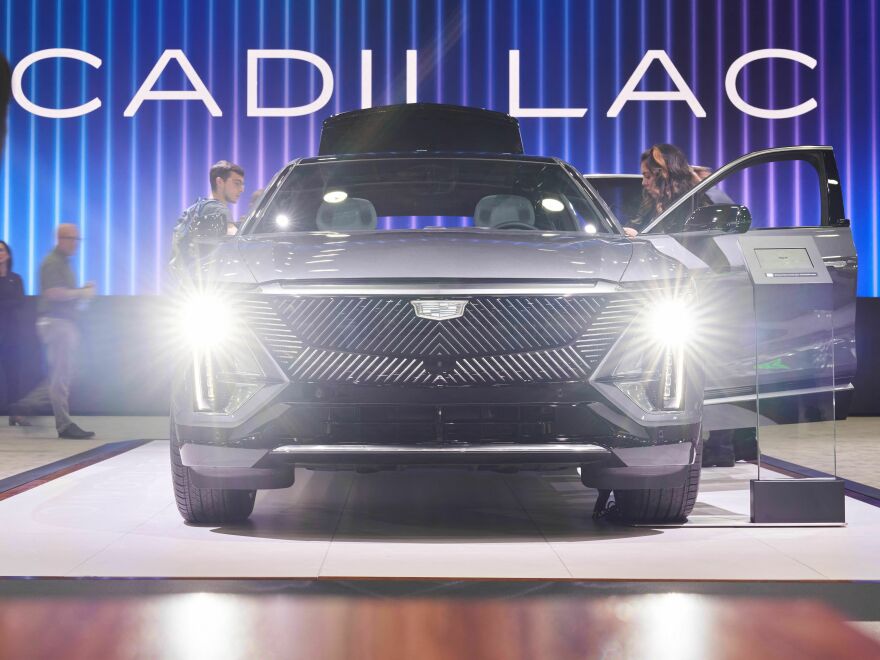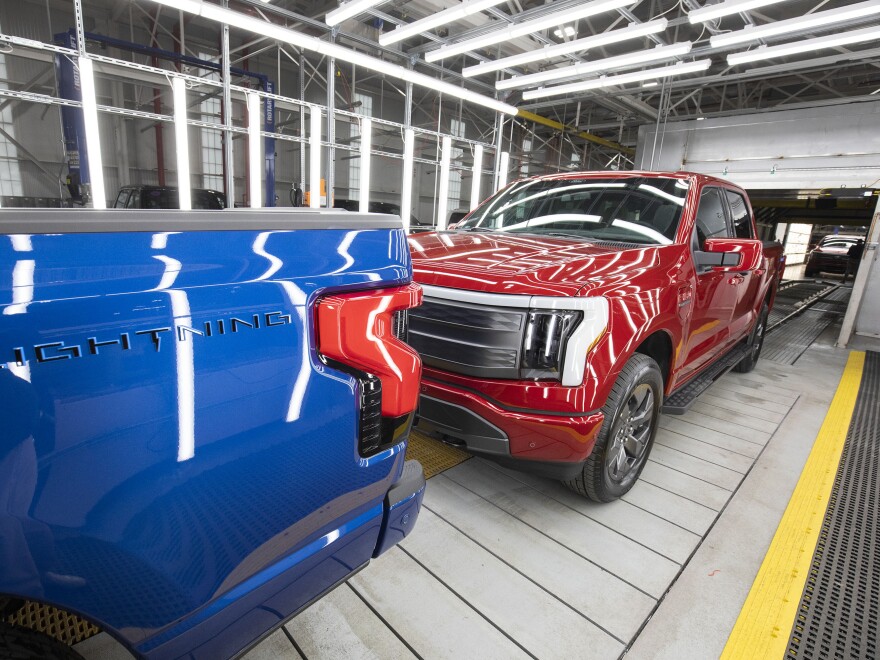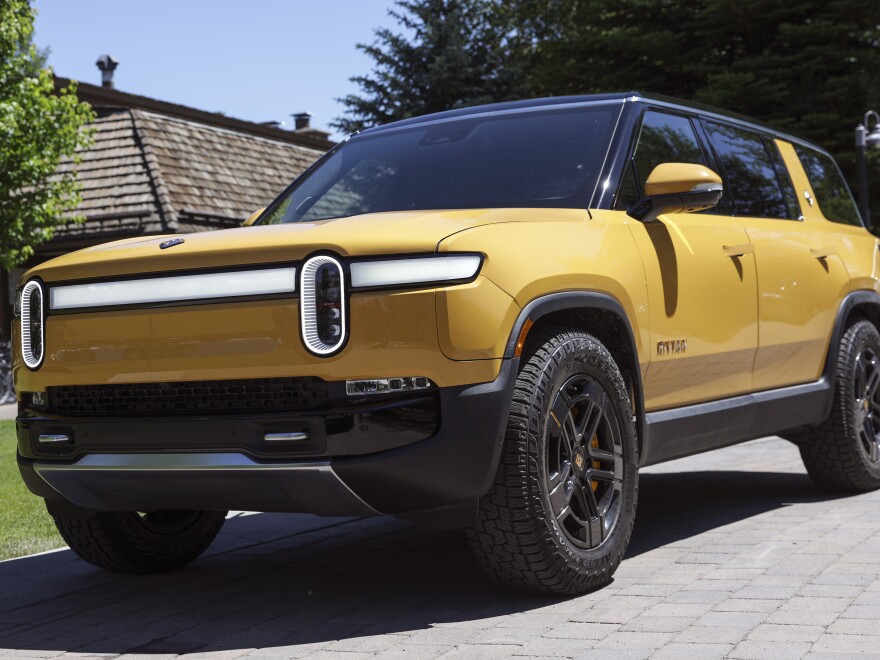The federal tax credits for electric vehicles, which have been a cause of confusion for automakers and car shoppers alike for months, are about to go through another big change.
Starting Tuesday, fewer vehicles will qualify for the current $7,500 tax credit. Some will get a $3,750 credit instead, and some cars will no longer get any credit at all, thanks to battery sourcing requirements that are kicking in.
The new rules, which were announced last month, require a certain percentage of battery minerals and components be sourced from North America or a U.S. trade partner. They are meant to incentivize U.S.-based production and were a part of the massive climate bill that revamped the tax credit for electric cars.
The official list of eligible vehicles will not be available until the IRS publishes it, which is expected to happen by Tuesday. But many automakers say they already know which vehicles will be on that list.
Here's we know so far.
After Tuesday, fewer vehicles will be eligible for $7,500
The $7,500 tax credit is actually two separate credits, worth $3,750 each. Right now every qualifying vehicle gets both credits, but starting April 18, vehicles could end up qualifying for neither, one, or both.
Automakers contacted by NPR say the following vehicles will still be eligible for both tax credits, worth $7,500:
- Cadillac Lyriq
- Chevy Silverado EV
- Tesla Model Y
- Tesla Model 3 (Performance)
- Ford F-150 Lightning
- Lincoln Aviator Grand Touring
- Chrysler Pacifica plug-in hybrid
Automakers believe these vehicles may be eligible for either $3,750 or $7,500:
- Chevy Bolt
- Chevy Bolt EUV
- Volkswagen ID.4 (vehicles built in Tennessee only)
And these are expected to be eligible for a single tax credit, for $3,750:
- Tesla Model 3 RWD
- Mustang Mach-E
- Ford E-Transit
- Ford Escape plug-in hybrid
- Lincoln Corsair Grand Touring plug-in hybrid
- Jeep Wrangler 4xe
- Jeep Grand Cherokee 4xe

At least one vehicle that is currently eligible will no longer receive any tax credit after April 18:
- Volvo S60 (PHEV), Extended Range and T8 Recharge (Extended Range)
Here are the vehicles that are currently eligible for the full credit, but that we still don't know what will happen after April 18:
- Audi Q5 TFSI e Quattro
- BMW 330e
- BMW X5 xDrive45e
- Genesis Electrified GV70
- Nissan Leaf S, S Plus, SL Plus, SV and SV Plus
- Rivian R1S
- Rivian R1T
So, if you're in the market for a Model Y or Ford Lightning, nothing should change. You can still get the entire $7,500 credit.
But if you have your eye on a Mustang Mach-E, or you're waiting on a Tesla Model 3 RWD, getting that vehicle delivered on Monday instead of Tuesday could mean $3,750 more in tax savings. (Note that the IRS says the vehicle needs to be delivered to the taxpayer, not just ordered, on or before the 17th.)
So wait, why is the tax credit changing yet again?
Last year's climate law, championed by the Biden administration, not only overhauled the tax credit for electric cars; it also added a number of restrictions designed to shore up U.S. supply chains.
In short, the idea was that car companies that wanted to take advantage of the tax credit would need to meet complicated rules meant to boost U.S-based production.
Those rules covered not only the manufacturing of the car, but also the sourcing of the materials that go into the batteries of the vehicles.
One of the $3,750 credits focuses on the raw materials inside batteries: a certain percentage of critical minerals, like lithium, graphite and cobalt, need to be mined or processed in the U.S. or a trade partner.
The other $3,750 credit is about battery manufacturing: a certain percentage of the battery components, like anodes, cathodes and electrolytes, need to be manufactured or assembled in North America.
Determining the specific guidelines for each, however, was so complicated that Treasury effectively delayed this aspect of the climate bill from going into effect while they worked it out.
The IRS finally came up with the rules late last month, hence the change in which cars will be eligible for the tax credit.

But beware: being 'eligible' doesn't guarantee a tax credit
In order to get a tax credit, other requirements still apply. Vehicles must meet battery size and vehicle weight requirements and, more significantly, meet these two requirements:
- Be assembled in North America
- Have a sticker price of less than $55,000 for cars and $80,000 for SUVs and trucks
Features can push up the sticker price and assembly locations can vary, so for any individual car, a buyer has to check that those assembly requirements and price limits are met.
And if you want an electric car, check your income as well.
It's not just the car that needs to qualify: there's an income cap for buyers. It's based on "modified adjusted gross income" — your income after certain deductions (like retirement contributions). It's generally line 11 on your 1040 form, but if you have foreign income or income from Guam or Puerto Rico, you'll need to add those back in.
The caps for new vehicles are:
- $300,000 for married couples filing jointly
- $225,000 for heads of households
- $150,000 for all other filers
You qualify if you earned less than the cap in either the current tax year or the previous year, so a single year of high income won't disqualify you.

Start thinking about next year's taxes
This year, you also need to make sure your tax liability is big enough that you can actually use the credit. It doesn't roll over. If you qualify for a $7,500 credit but only owe $3,000, your tax bill would be reduced to zero (and you'd be refunded any money withheld from your paychecks) but the extra $4,500 goes poof; it doesn't get paid out to you.
Next year, in 2024, this will change. You'll be able to receive the tax credit as an immediate discount on the price. So as long as you qualify, you'll get the benefit — regardless of the size of your tax bill.
What about used vehicles?
There is a lower tax credit for used electric vehicles, and it's not changing.
Here's what you need to know. There is an income cap, and like with new cars, it's based on modified adjusted gross income (line 11 on your 1040, unless you have foreign income or income from a territory to adjust for). And like with new vehicles, you qualify if you are under the income cap in either the current or the previous year. The income caps for used vehicles are:
- $150,000 for married couples filing jointly
- $112,500 for heads of households
- $75,000 for all other filers
For used vehicles, the list of requirements isn't too long:
- You need to be buying the used EV from a dealer, not a private party.
- Each vehicle can only claim the used credit once, so it can't have been sold for the used vehicle tax credit already
- The vehicle needs to be at least two years old, and meet weight and battery size requirements (here is a list of qualifying vehicles)
- The purchase price needs to be $25,000 or less.
The last might be the biggest challenge. According to Cox Automotive, prices for used EVs are coming down, but the average listing price last quarter was still $43,400.
But if you find a qualifying vehicle, you can get a tax credit worth 30% percent of the sale price, up to a cap of $4,000.

Want to lease? That's easy.
Leased vehicles qualify for a separate $7,500 tax credit with no restrictions on price, income or where the car was built.
There's one wrinkle: A tax credit for a leased vehicle goes to the leasing company, not directly to the driver, so make sure that your contract actually passes the discount along to you.
The tax credits will continue to change
These rules are still in flux in many ways, including:
- Automakers are already scrambling to shift their supply chains to comply, so more cars might qualify over time ...
- ... but every year, the required percentages get higher, and new restrictions on Chinese components will soon kick in too. So fewer cars might qualify.
- Buyers will be able to get the credit as a discount at the dealership, instead of a credit on their own taxes, starting next year.
- The way the IRS implements these rules could change. The current implementation has been criticized by some members of Congress, who think the Biden administration has added so much flexibility for automakers that it undermines the goal of the legislation.
Long story short: If you want to buy an EV in the future, you will have to confirm at the time you purchase the vehicle whether it qualifies.
Copyright 2023 NPR. To see more, visit https://www.npr.org.



